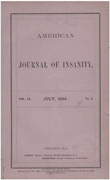Somatic symptoms and HIV infection: relationship to depressive symptoms and indicators of HIV disease
Abstract
OBJECTIVE: This study examined the relationship of the somatic symptoms fatigue and insomnia with indicators of both psychiatric disturbance and HIV disease severity. METHOD: Study participants were 98 asymptomatic HIV-infected and 71 uninfected homosexual men; 82 HIV- infected and 64 uninfected men had 6-month follow-up examinations. Scales from the self-reported Profile of Mood States measured fatigue and dysphoric mood. Major depression diagnosis was determined by the Structured Clinical Interview for DSM-III-R. Selected items from the Hamilton depression and anxiety scales measured insomnia and other symptoms of depression. Performance on a battery of standardized tests determined neuropsychological function ratings. RESULTS: At study entry, complaints of fatigue and insomnia were associated with dysphoric mood, major depression, and other non-HIV-related symptoms of major depression but not with CD4 cell counts or neuropsychological functioning. Increases in levels of fatigue and insomnia over the 6- month follow-up period were associated with increases in non-HIV- related symptoms of depression and in severity of dysphoric mood. Increases in fatigue were also associated with decrements in motor functioning. Otherwise, fatigue or insomnia were not associated with HIV disease progression. CONCLUSIONS: These findings suggest that complaints of fatigue and insomnia in otherwise asymptomatic HIV- infected patients are likely to be related to psychological disturbances and possibly major depression, which can be treated. HIV- infected patients who complain of fatigue or insomnia should routinely be assessed for major depression.
Access content
To read the fulltext, please use one of the options below to sign in or purchase access.- Personal login
- Institutional Login
- Sign in via OpenAthens
- Register for access
-
Please login/register if you wish to pair your device and check access availability.
Not a subscriber?
PsychiatryOnline subscription options offer access to the DSM-5 library, books, journals, CME, and patient resources. This all-in-one virtual library provides psychiatrists and mental health professionals with key resources for diagnosis, treatment, research, and professional development.
Need more help? PsychiatryOnline Customer Service may be reached by emailing [email protected] or by calling 800-368-5777 (in the U.S.) or 703-907-7322 (outside the U.S.).



